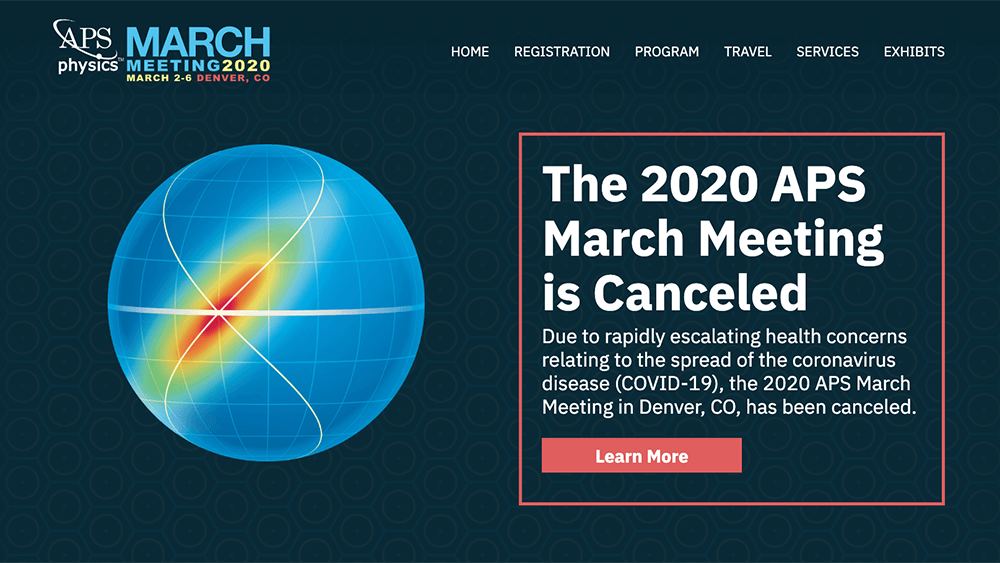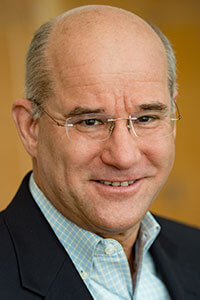
Organizers of the 2020 American Physical Society March Meeting decided to cancel less than two days before the event due to concerns over the COVID-19 outbreak.
Takeaways from Hunter Clemens, APS director of meetings:
- You have to think of worst-case scenarios when doing your scenario planning.
- Make sure you have a solid crisis and communications plan in place before you go on site.
- Relationships you have built in the industry are invaluable when navigating in a crisis situation.
Amidst recent news of a growing number of event cancellations as a result of the coronavirus outbreak, the 2020 American Physical Society (APS) March Meeting stands out because of its sudden nature. Convening 10,000-plus physicists in academia, laboratories, and industry from around the world in Denver, March 2–6, the association’s leadership made the decision to cancel on late Saturday, Feb. 29, less than two days before it was to begin.
The “gut-wrenching” decision was made “out of an abundance of caution,” APS director of meetings, Hunter Clemens, CAE, CMP, told Convene. Clemens and APS leaders had been monitoring the coronavirus outbreak in the weeks leading up to the event and communicating messages to stakeholders on its website. “We kept looking at the CDC’s [Centers for Disease Control and Prevention] recommendations,” Clemens said. “It was low for the US. The concern when we started [monitoring the situation] was China.” Five-hundred attendees from China had registered for the March Meeting and were then unable to attend.
Clemens had arrived in Denver on Friday, Feb. 28, and met with the Denver CVB to start getting the program underway. When APS CEO Kate Kirby flew in on Saturday, she called Clemens saying they needed to meet right away. “This is urgent,’” she told him.

Hunter Clemens, CAE, CMP
On Saturday, the CDC upgraded South Korea and Italy to a Level 3 Travel Warning. “We considered the number of registrants coming from those destinations — only 35 from Italy, but about 161 from South Korea, and 300 from Japan. Even though the CDC had not elevated the risk level for Japan, the outbreak in that country was enough of a concern,” Clemens said, “for us to think that’s a risk.”
The CDC elevated warning was for travel out of the U.S. into those countries. But what about people coming to the U.S. from those countries? Was it more likely that they would be carrying COVID-19 and spread it to other delegates?
“Our concern was that between 10,000 and 11,000 people were showing up for this event,” Clemens said. “We did scenario planning. What if somebody gets sick? If somebody gets sick, and we don’t know if it is the flu or coronavirus, we have a crisis on our hands. A worst-case scenario was the possibility of having 10,000 to 11,000 people quarantined in Denver.”
And, of course, he added, “we considered our staff, our members, our vendors, and the Denver community.” And while Clemens had walked into his meeting with his CEO and the board on a conference call, thinking, “We should not cancel,” he walked out thinking, “We have to cancel.”
It was “gut-wrenching,” he said, but we decided to cancel “out of an abundance of caution. Honestly, the timing was unfortunate” he added, considering that some attendees had already started arriving in Denver. Clemens also commented on the “amazing” APS staff that worked swiftly as a team to execute the cancellation in an orderly fashion.
When Convene spoke to Clemens Monday night, he had spent the entire day meeting with hotels and talking about cancellation — “it’s huge,” he said.
But he said he was encouraged that the hotels were listening. He stressed that “it’s a very individual thing with each organization” when it comes to event cancellations, so he wouldn’t make any blanket recommendations. “We requested the hotels not to charge the attendees cancellation fees, because we canceled,” Clemens said.
Clemens said that as “an act of good faith,” APS will work to book their next open year for their March Meeting, in 2026, in Denver. “We’ve got to go through the process,” he said, “to determine availability, etc.”
As far as sharing some of the content that would have been presented at the event, Clemens said that they are working hard on pulling that together. “It’s amazing because within our community we have a lot of different divisions of physics,” he said. “Members of the March Meeting Program Committee have already begun to work on it.” In addition, he said, “Google has come forward and is offering to help in terms of doing something virtual with these presentations, so we’re talking with them and looking at other options as well.”
Clemens expects he’ll become even more knowledgeable about providing a virtual event “faster than expected — it’s opened up a whole new door.”
As far as Denver’s CVB and the community, “I can’t say enough,” Clemens said. “They get it. They understand. Some have come up to me to say, ‘Thank you for considering our community in this decision.’ The next morning, [Rachel Benedick, executive vice president, sales and services, for Visit Denver] was right there saying, ‘We understand, what can we do for you?’ All of them: ‘What can we do? How can we help?’ And that’s all I’ve heard while I’ve been here — ‘This must be tough.’ Yeah, it is.”
If there’s just one takeaway Clemens can share from this experience, he said it would be for other event organizers to make sure they have a crisis plan in place before you go on site. “We did, and leadership worked with the APS crisis management team. They understood the value of having the input of a meeting professional and they wanted me to be a part of that decision.” Another point is to make certain you have your communications plan in place. Clemens credits the APS Communications team for their swift action in getting the word out.
Clemens said that the relationships that you have built with suppliers in the industry are also extremely helpful in a crisis situation and he credits his time as a volunteer leader at PCMA — he served on the PCMA Board of Directors from 2009-2012 and co-chaired the Strategic Plan Task Force in 2010 — with helping to build those relationships.
“I want to emphasize that we made this decision based on the wellbeing of everyone involved,” Clemens said. “We could not risk bringing the coronavirus into Denver, and it’s affecting the community, and our staff, and our attendees, vendors, all of that. That consideration drove the decision. Because we thought about what would happen if….”
Michelle Russell is editor in chief of Convene.
What Events Professionals Need to Know About COVID-19
PCMA has created a COVID-19 resources page to help event professionals find reliable information about the outbreak and to share events industry-related resources to ensure they are prepared.
